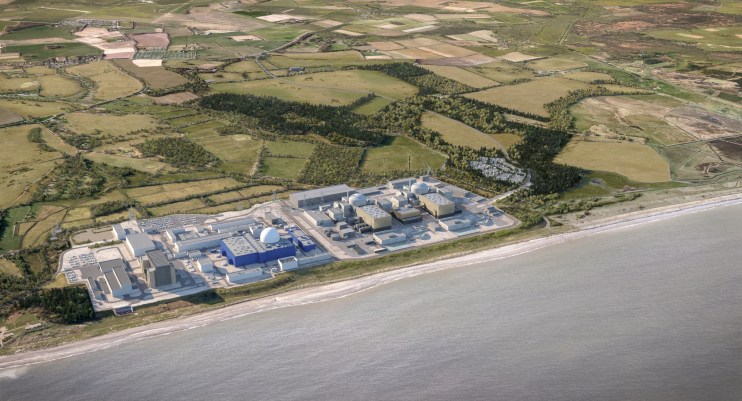Not funding Sizewell C risks UK’s green ambitions, nuclear industry warns

The nuclear industry has rushed to defend the £35bn Sizewell C nuclear project amid reports the project is struggling to lure domestic investors – highlighting its green credentials.
Tom Greatrex, chief executive of the Nuclear Industry Association, told City A.M.: “It’s important to remember that Sizewell C will make the greatest single contribution to fighting climate change of any project in UK history. It will use a tiny amount of space to create a huge amount of low carbon energy, freeing up land for nature.”
Sizewell C is a proposed 3.2GW nuclear power plant in Suffolk, which awaits a final investment decision and approval from the government.
If completed, the plant will power 6m homes and support over 10,000 jobs in the area.
It is near-identical in design to the under-construction Hinkley Point C, with an estimated cost of £20-35bn, with both plants overseen by French energy giant EDF.
The government is targeting a vast ramp-up in nuclear power from 7GW to 24GW of energy generation over the next three decades, which will consist of GW power plants and small modular reactors.
This is part of Downing Street’s energy security strategy, designed to bolster domestic energy generation and reduce the country’s reliance on overseas suppliers following Russia’s invasion of Ukraine.
It is also essential for the country’s net zero ambitions, with the government targeting a full transition to green energy by 2050.
Nuclear is a low-carbon continuous power source, making it attractive as a baseload option for energy compared to intermittent sources such as wind and solar, and carbon-intensive options like gas and coal.
“Nuclear projects like Sizewell C are also still the only projects that know what they are going to do with their waste, and set aside funding streams to deal with it, before construction even begins,” Greatrex said.
Nevertheless, the project has reportedly suffered difficulties in securing funding.
Sizewell C nuclear project faces funding hurdles
Fund managers at Legal & General and Aviva have both opted against supporting the project, according to The Telegraph.
Meanwhile, Natwest and the BT Pension Scheme have both told the localist opposition group Stop Sizewell C they will not be funding the power plant.
This is despite the government easing financial conditions for new projects.
Former energy secretary Kwasi Kwarteng unveiled the Nuclear Financing Bill in 2021, which enabled new power plants access to the regulatory asset base model – where taxpayer funds would be used for initial development and construction before the private sector would come onboard.
Last month, Chancellor Jeremy Hunt announced plans in the spring budget to reclassify nuclear power as environmentally sustainable, so that it can enjoy the same investment perks as renewable energy sources.
Greatrex remains bullish over Sizewell C’s financial prospects.
“Investors increasingly understand the case for nuclear, and the government’s full commitment to ramping up nuclear capacity, including its planned inclusion in the green taxonomy, will give them further confidence,” he said.
Concerns over nuclear power in the UK chiefly centre around the costs and development time, with Hinkley Point C set to open four years late in 2027 at nearly double its proposed budget – rising from £18bn to £33bn.
Sizewell C is unlikely to be operating until the mid to late 2030s, even if approved.
So far, the government has contributed £800m towards Sizewell C and paid off China General Nuclear to obtain its 20 per cent stake.
City A.M. spoke with EDF’s head of financing, Julia Pyke last year, where she argued cost overruns should not deter from the long-term role nuclear power can play in the UK’s energy mix.
She said: “To me this is a bit like: was the 1858 sewerage system late and over budget? Yes, it was. Do you wish London didn’t have a sewage system? No, you don’t. Was the London Underground in Victorian era built late and over budget? Yes, it was. Do you wish you didn’t have the Circle Line? No, you don’t. So, there’s a lack of proportionality in the way that people look at the cost of these mega projects.”
When approached for comment, a department for energy security and net zero spokesperson said: “We are working closely with the project company to attract new finance. We know many investors are prepared to support infrastructure delivering energy security and net zero, including new nuclear power, and we are confident that investors will take assurance from the Government’s clear commitment to the nuclear sector.”
EDF has also been approached for comment.